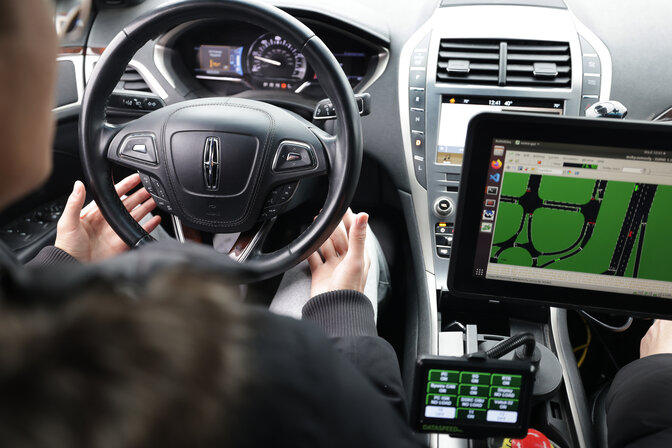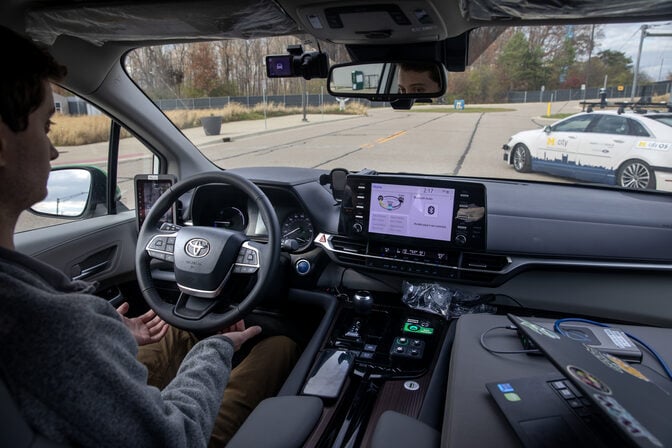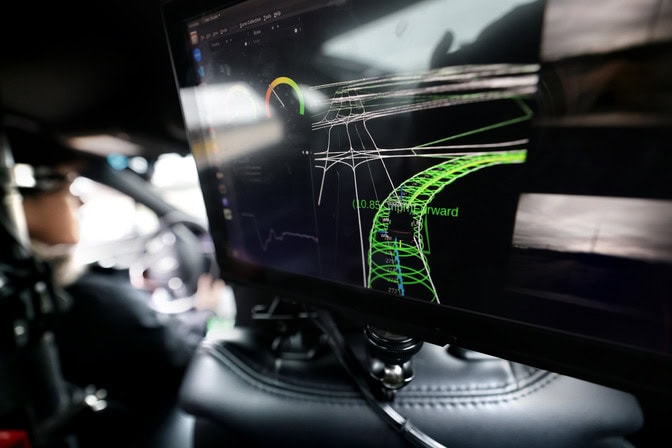
Free certificate in connected/automated transportation aims to bring more engineers into the field
Courses offered to engineering students at CCAT partner universities in the Midwest.

Courses offered to engineering students at CCAT partner universities in the Midwest.
Experts
Connected and automated vehicle (CAV) technologies are among the most critical and exciting areas of research in all of engineering today, but they’re often locked behind doors not everyone can enter.
The rate of development has many educational institutions struggling to keep pace. Whether it’s a lack of curriculum offerings, facilities or expert access, many students don’t get the training necessary to gain a foothold in the field. And it’s a growing field in need of more engineers to make the promise of these technologies a reality.
Led by the University of Michigan, the Center for Connected and Automated Transportation (CCAT) is launching a free online certificate program to crack that door open for graduate and undergraduate engineering students at schools at the eight CCAT member schools.
It’s a 100-hour course divided into five 20-hour modules that explore different facets of CAV technologies and impacts. Professors from U-M, the University of Wisconsin-Madison and industry representatives will teach the modules. And upon completion, students will receive a certificate from CCAT—proof that they have an understanding of CAV basics and beyond.
“We realized there is a gap in the educational content of transportation engineering systems with regard to the breadth of autonomous vehicle technologies set to be integrated into the latest vehicles,” said Neda Masoud, a U-M associate professor of civil and environmental engineering and CCAT’s associate director of education. “It seems like transportation engineering programs are mostly geared more towards traditional transportation practices.”
The program will begin Monday, Jan. 6, 2025. Students have until the end of the Fall 2025 semester to complete the coursework. Registration opens Nov. 15.
Modules include:
“The Connected and Automated Transportation Certificate Program allows us to reach students who have never had access to these types of courses before,” said Henry Liu, CCAT’s director and a U-M professor of civil and environmental engineering. “Educating students from diverse backgrounds as they enter the workforce is critical to fostering innovation and increasing transportation equity.”

Announced in 2016 and funded with $15.76 million over its first six years, CCAT is one of 10 regional US Department of Transportation University Transportation Centers nationwide. Along with U-M, partners include the University of Akron, Central State University, the University of Illinois at Urbana-Champaign, the University of Minnesota, Northwestern University, Purdue University, Washtenaw Community College and the University of Wisconsin-Madison.
“CCAT is a pre-eminent CAV-focused research center, and learning from the best at CCAT will give you deep insight into and understanding of CAV concepts,” said James Misener, global V2X Ecosystem Lead at Qualcomm. “Those learnings will imbue knowledge to certificate holders as they develop and deploy CAVs, and that’s a significant and worthwhile advantage to candidates who seek to differentiate themselves on the basis of quality.”
CCAT’s certificate offers students the opportunity to tap into this expertise without relocating, and it gives member universities the ability to expand course offerings to those students.

“Here at Central State, we have two programs: an environmental engineering program and we have a manufacturing engineering program,” said Ramani Kandiah, a CSU professor of environmental engineering and a CCAT member. “So we’re usually sending graduates into the water industry or into solids management.
“This certificate program is a linking path for our students—giving them wider opportunities to get jobs in the transportation industry.”
Since its creation, CCAT, which originally included six institutions, has produced a broad range of research that includes:
CCAT partners also engaged with over 400 undergraduate and graduate students and oversaw the creation of several educational courses for kindergarten level through college. The courses reached students at Washtenaw Community College, Purdue University and U-M.